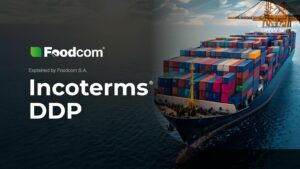DDP – what is it?
DDP, standing for “Delivered Duty Paid,” is an international trade term used to denote a specific type of delivery agreement between a seller and a buyer. Within the framework of this agreement, the seller assumes all responsibilities and costs associated with transporting goods until they arrive at the specified destination, including import duties and taxes. This ensures that the buyer doesn’t encounter unforeseen expenses or complications during the importation process.
Most common questions
1. How does DDP differ from other Incoterms?
Incoterms, or International Commercial Terms, are predefined trade terms that determine responsibilities between sellers and buyers regarding shipment, risks, and costs. DDP is unique in that it places the maximum obligation on the seller, making them responsible for all costs and risks up to the delivery point, including import duties and taxes. In contrast, other terms like EXW (Ex Works) or FOB (Free On Board) place different degrees of responsibility on the buyer and seller.
2. Is DDP suitable for all international transactions?
Not always. While DDP simplifies the process for buyers, it requires the seller to have extensive knowledge and capabilities in international logistics and customs procedures. Before opting for DDP, both parties should assess the nature of their transaction, the capabilities of the seller, and the regulatory environment of the destination country.
3. How are duties and taxes determined under DDP?
The seller is responsible for calculating, prepaying, and managing all import duties and taxes based on the destination country’s regulations. These costs are typically factored into the product’s price or quoted separately during the transaction. It’s essential for the seller to stay updated on tariff rates and any regulatory changes in the destination country to ensure accurate cost calculation.




